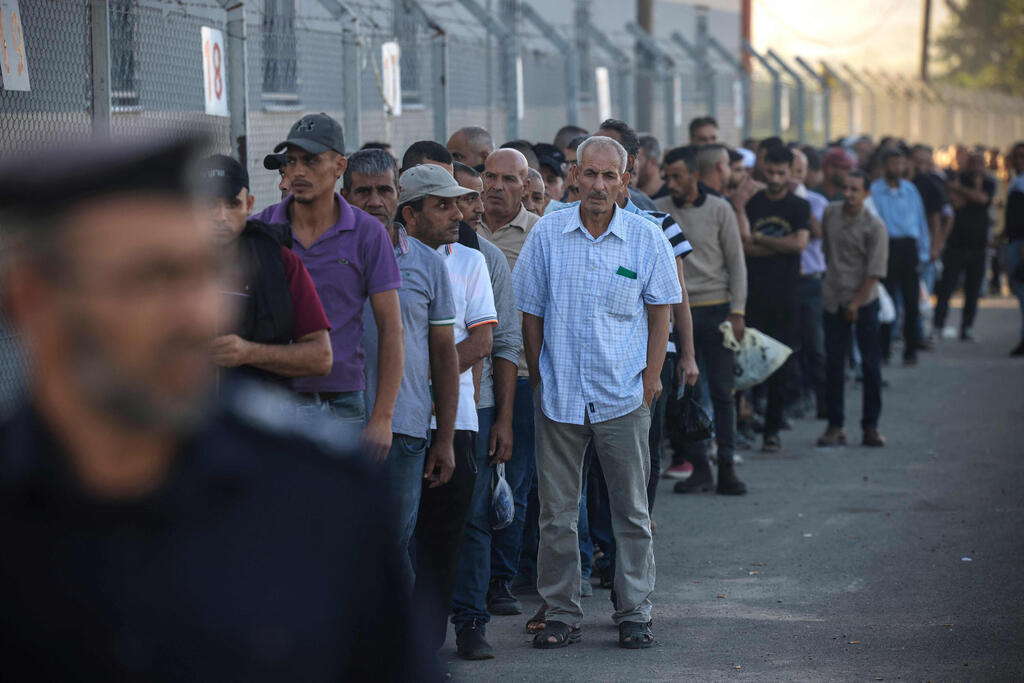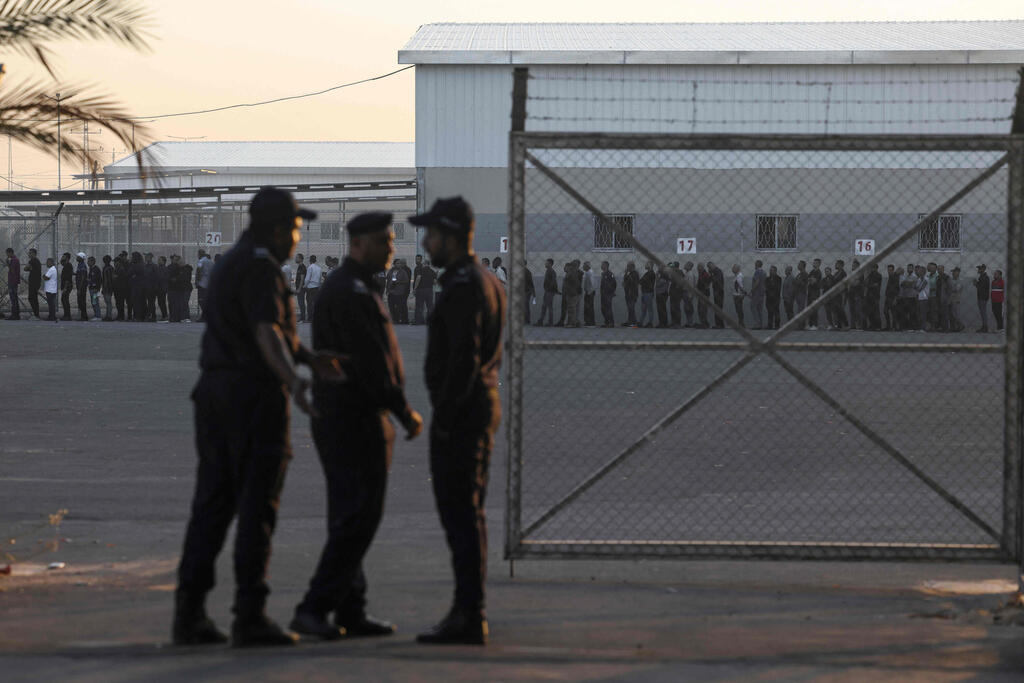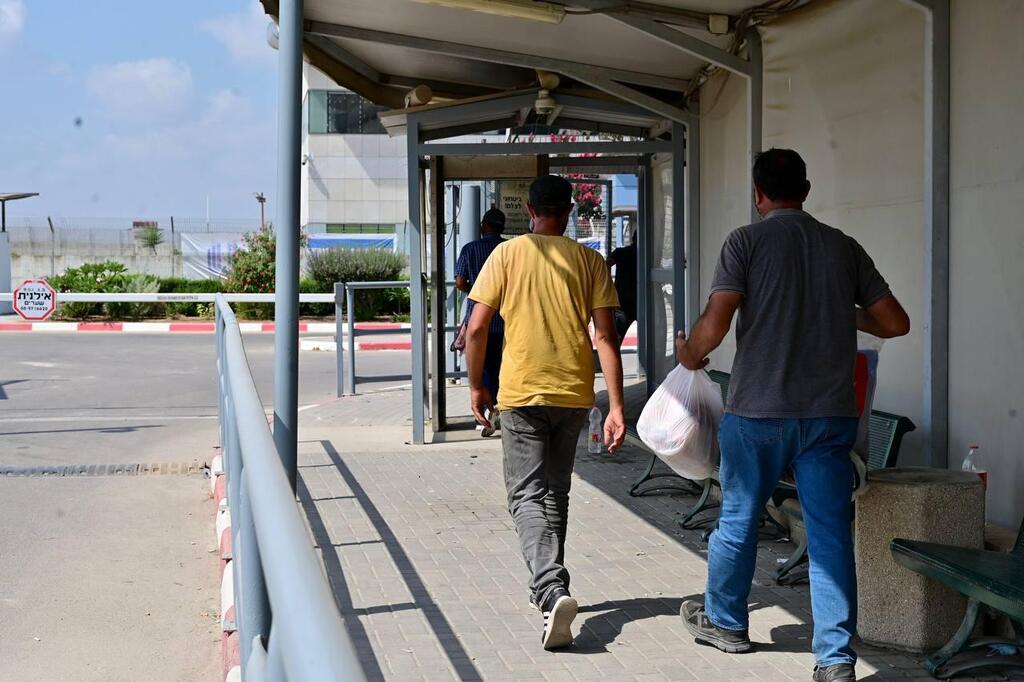Following October 7 massacre, ministers banned entry of Palestinian workers into Israel, however, they are turning to jobs in settlements; 'Economic situation in West Bank primarily Israeli security interest,' security official says
Elisha Ben Kimon|
Yesterday | ynetnews
While the Security Cabinet is stalling on a decision to allow Palestinian workers to re-enter for work in Israel, the number of Palestinian workers coming to work in West Bank areas is steadily increasig.
According to defense establishment data, the number of Palestinian workers employed in industrial zones in the West Bank, in factories, and even within some settlements, has already surpassed 10,000. Approximately 8,000 Palestinians work in industry, around 1,500 in services and about 1,300 in construction. Others are employed in agriculture and various other sectors.

Archival: Palestinian laborers waiting to enter Israel from Gaza's Erez border crossing
(Photo: MOHAMMED ABED / AFP)
Security sources say that the demand for Palestinian workers in the West Bank comes from contracting companies whose work has been halted and affected, as well as from within the settlements themselves.
"As time passes, we receive more and more requests from companies and communities seeking to bring in Palestinian workers, of course, under security protocols. There are many projects that have been halted and a lot of money that people have lost," a security official explained.
The increase in demand has occurred recently, especially after the local elections in February. Until then, for obvious reasons, council leaders preferred not to address the issue. After the elections, the floodgates opened, and the IDF and the Civil Administration began receiving numerous requests, primarily to bring in workers for employment.
In the West Bank region, unlike within Israel proper, the approval of the Central Command commander is sufficient to permit the entry of workers. Due to the numerous requests received on one hand, and the desire of some residents not to admit Palestinians on the other, the Central Command has developed a mechanism that ensures no settlement is forced to admit workers. According to the law, if the commander approves the entry of workers to a company whose factory is within a settlement, the settlement cannot legally oppose it.

(Photo: MOHAMMED ABED / AFP)
Due to this sensitivity, it was decided by the command that workers would be allowed entry only with the approval of the settlement committee, followed by the approval of the council to which it belongs.
Before the war, approximately 40,000 workers were employed in the West Bank, and about 100,000 in Israel. Currently, 6,000–8,000 workers are employed in Israel, and more than 10,000 in the West Bank. "It has reached a point where large companies from various sectors operating in Israel are requesting to open small factories in the West Bank to employ Palestinians," an industry source noted.
The workers in the West Bank are employed, among other places, in the Barkan, Mishor Adumim and Ariel industrial zones, and cities like Beitar Illit and others.
"Besides the security issue, where Iran and Hamas are sending money to the West Bank while the workers sit at home, it is important to understand that the prohibition on the entry of workers increases the phenomenon of illegal residents," a security official explained.
"Recently, we have seen worker smuggling, apprehensions at checkpoints and attempts to infiltrate by crossing the border fence. The numbers are not large, but there is concern that it could escalate. A worker who holds a permit and infiltrates is not supervised, unlike someone who would enter legally and be monitored."

(Photo: Nadav Eves)
However, not every West Bank settlement is willing to accept Palestinian workers. Some settlements have decided not to admit workers at this stage, some are still deliberating and have not held votes, and some have held votes and approved it.
While members of the Cabinet still prohibit the entry of workers into Israel, the defense establishment is trying to create innovative solutions to inject some money into the Palestinian Authority territories, with the aim, in their view, of preventing its collapse.
Among other measures, the entry of Arab-Israelis to Jenin through the Jalameh Crossing was recently approved for the first time since the beginning of the war. In the first week of opening the crossing, about 7,000 vehicles passed through it, and according to professional estimates, they generated an income of approximately three million shekels just that weekend. It is estimated that additional crossings for Arab-Israelis into the Palestinian Authority territories are expected to open in the future.
"The economic situation in the West Bank is primarily an Israeli security interest," a security official explained. "We must remember that on the other side, there is Iran and other foreign terrorist organizations, ready to invest a lot of money and resources to fund terrorism. After October 7, no one wanted to admit Palestinian workers into their settlement or area. Today, the trend is quite different. In the end, someone needs to take out the trash and build the houses.
“Meanwhile, it seems decision-makers are mostly focused on saying 'no' and are avoiding providing solutions. We are certainly not forcing the settlements, but we are working to allow those who want to employ Palestinian workers to do so, and of course, we have significantly tightened security conditions."
While the Security Cabinet is stalling on a decision to allow Palestinian workers to re-enter for work in Israel, the number of Palestinian workers coming to work in West Bank areas is steadily increasig.
According to defense establishment data, the number of Palestinian workers employed in industrial zones in the West Bank, in factories, and even within some settlements, has already surpassed 10,000. Approximately 8,000 Palestinians work in industry, around 1,500 in services and about 1,300 in construction. Others are employed in agriculture and various other sectors.

Archival: Palestinian laborers waiting to enter Israel from Gaza's Erez border crossing
(Photo: MOHAMMED ABED / AFP)
Security sources say that the demand for Palestinian workers in the West Bank comes from contracting companies whose work has been halted and affected, as well as from within the settlements themselves.
"As time passes, we receive more and more requests from companies and communities seeking to bring in Palestinian workers, of course, under security protocols. There are many projects that have been halted and a lot of money that people have lost," a security official explained.
The increase in demand has occurred recently, especially after the local elections in February. Until then, for obvious reasons, council leaders preferred not to address the issue. After the elections, the floodgates opened, and the IDF and the Civil Administration began receiving numerous requests, primarily to bring in workers for employment.
In the West Bank region, unlike within Israel proper, the approval of the Central Command commander is sufficient to permit the entry of workers. Due to the numerous requests received on one hand, and the desire of some residents not to admit Palestinians on the other, the Central Command has developed a mechanism that ensures no settlement is forced to admit workers. According to the law, if the commander approves the entry of workers to a company whose factory is within a settlement, the settlement cannot legally oppose it.

(Photo: MOHAMMED ABED / AFP)
Due to this sensitivity, it was decided by the command that workers would be allowed entry only with the approval of the settlement committee, followed by the approval of the council to which it belongs.
Before the war, approximately 40,000 workers were employed in the West Bank, and about 100,000 in Israel. Currently, 6,000–8,000 workers are employed in Israel, and more than 10,000 in the West Bank. "It has reached a point where large companies from various sectors operating in Israel are requesting to open small factories in the West Bank to employ Palestinians," an industry source noted.
The workers in the West Bank are employed, among other places, in the Barkan, Mishor Adumim and Ariel industrial zones, and cities like Beitar Illit and others.
"Besides the security issue, where Iran and Hamas are sending money to the West Bank while the workers sit at home, it is important to understand that the prohibition on the entry of workers increases the phenomenon of illegal residents," a security official explained.
"Recently, we have seen worker smuggling, apprehensions at checkpoints and attempts to infiltrate by crossing the border fence. The numbers are not large, but there is concern that it could escalate. A worker who holds a permit and infiltrates is not supervised, unlike someone who would enter legally and be monitored."

(Photo: Nadav Eves)
However, not every West Bank settlement is willing to accept Palestinian workers. Some settlements have decided not to admit workers at this stage, some are still deliberating and have not held votes, and some have held votes and approved it.
While members of the Cabinet still prohibit the entry of workers into Israel, the defense establishment is trying to create innovative solutions to inject some money into the Palestinian Authority territories, with the aim, in their view, of preventing its collapse.
Among other measures, the entry of Arab-Israelis to Jenin through the Jalameh Crossing was recently approved for the first time since the beginning of the war. In the first week of opening the crossing, about 7,000 vehicles passed through it, and according to professional estimates, they generated an income of approximately three million shekels just that weekend. It is estimated that additional crossings for Arab-Israelis into the Palestinian Authority territories are expected to open in the future.
"The economic situation in the West Bank is primarily an Israeli security interest," a security official explained. "We must remember that on the other side, there is Iran and other foreign terrorist organizations, ready to invest a lot of money and resources to fund terrorism. After October 7, no one wanted to admit Palestinian workers into their settlement or area. Today, the trend is quite different. In the end, someone needs to take out the trash and build the houses.
“Meanwhile, it seems decision-makers are mostly focused on saying 'no' and are avoiding providing solutions. We are certainly not forcing the settlements, but we are working to allow those who want to employ Palestinian workers to do so, and of course, we have significantly tightened security conditions."
No comments:
Post a Comment